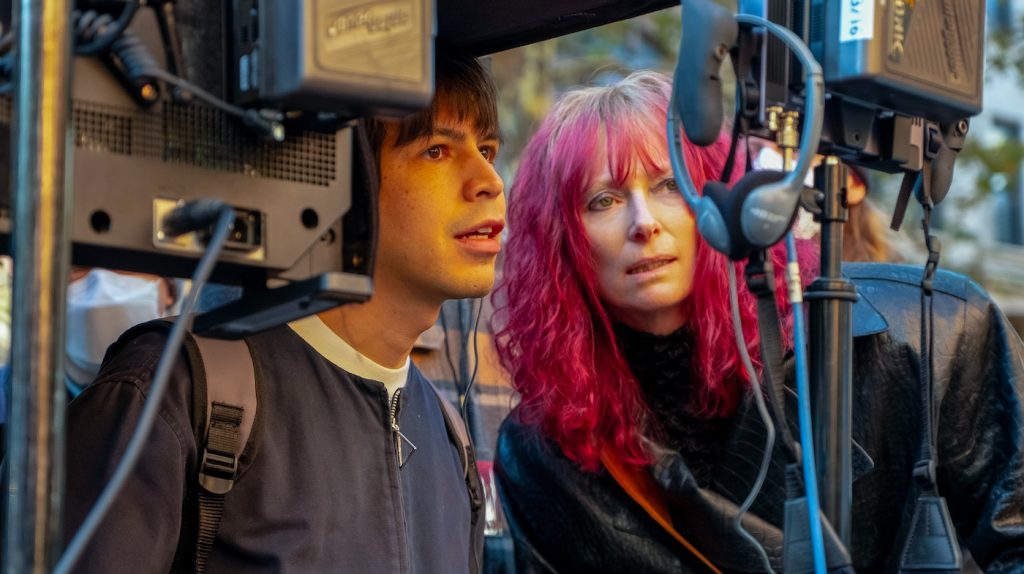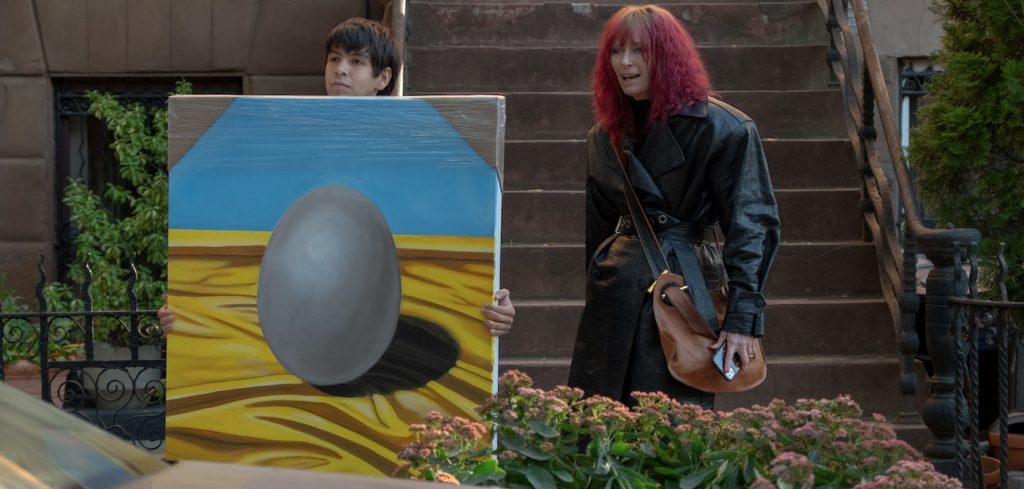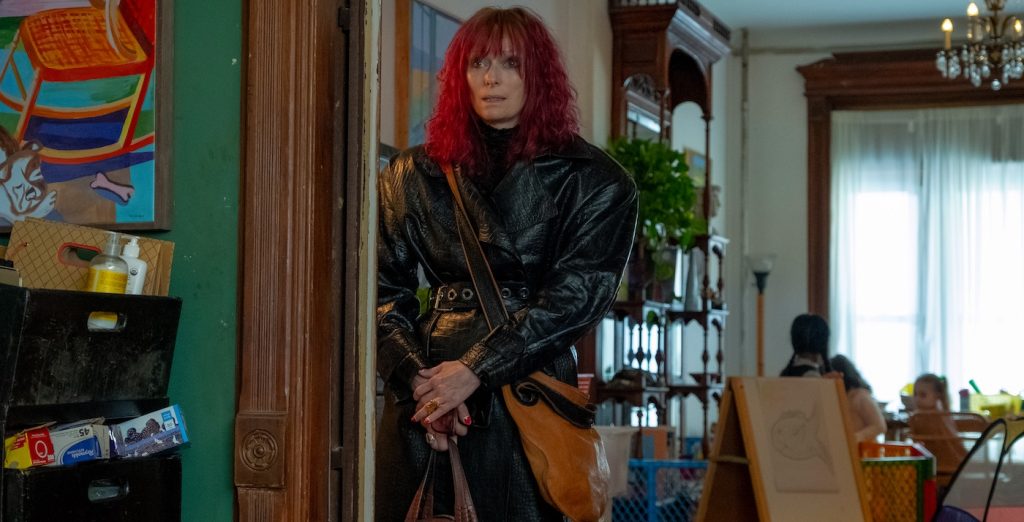From “SNL” to the Director’s Chair: Julio Torres Lights Up With “Problemista”
There is a cornucopia of comedy happening in Problemista, Julio Torres’ debut feature. In a little over 90 minutes, writer/director Torres pokes fun at cryonics, the Kafkaesque bureaucracy of the U.S. immigration system, and the eccentricities of the art world. Along the way, there are jabs at Craigslist, FileMaker Pro, and Bank of America. All of it is wrapped around a virtuoso performance by Tilda Swinton as a madcap, multicolored-hair patron of the arts who doesn’t suffer fools or anyone else who crosses her path, for that matter.
Torres, who was born in El Salvador, says the inspiration for Problemista grew out of events in his own life after he moved to New York to attend school and pursue a career in comedy. In the ensuing years, as Torres was earning four Emmy nominations as a staff writer on Saturday Night Live and co-creating and starring in the off-the-wall HBO comedy series Los Espookys, which brought him a Peabody Award, the elements of Problemista were taking shape.

“It was somewhere around five years ago that I started thinking about it,” Torres said during a recent conversation via Zoom. “It wasn’t so much that I had one idea and started writing. It happened slowly and naturally. I started collecting different ideas and very gradually built what the movie became. When they all came together it was, ‘Hey, it’s time for a script!’”
The idea of Torres directing happened more recently.
In 2021, with Swinton on board to play Elizabeth, Torres secured financing and distribution from A24 for his alluringly sweet and surrealistically absurd tale of Alejandro, a Salvadoran immigrant scrambling to avoid deportation as he pursues his dream job of designing toys for Hasbro. In his quest, Alejandro crosses paths with Elizabeth, a blustery art critic caring for her deceased husband Bobby (RZA), an artist who has been cryogenically frozen in the hopes he can be thawed and revived once a cure is discovered. Elizabeth offers Alejandro the opportunity to curate a show of Bobby’s work, a collection of 13 paintings — all depicting eggs in various artistic settings. If Alejandro is successful in securing a gallery exhibit, Elizabeth will sponsor him for a visa.
“I had no intention to direct when I was writing it. I had in the back of my mind that I would like to be in it,” Torres continues. “Then, in our search, it became more and more obvious that the truest vision of the movie would come from me. Even though I felt I wasn’t quite ready, I was motivated by Tilda and other people in my life to do it. I don’t know that I was necessarily the best choice. But I think I was the more appropriate choice.”

Torres cites a range of filmmakers that he feels helped guide his choices. Terry Gilliam and Bong Joon-ho are mentioned first. Torres then adds how his cinematic tastes were honed during his teenage years by the films of David Lynch, Wes Anderson, the Coen brothers, and Sophia Coppola.
“I’m trying to think of some of my earlier favorites,” Torres says. “The one that keeps coming to mind is Jonathan Glazer’s movie Birth with Nicole Kidman. Everyone whose work is so different, like a Gregg Araki or a John Waters, for example. That’s what I try to aspire to. They are fully formed voices that are marching to the beat of their own drum. That is what I hope to do.”
Another inspirational muse was New York City itself. Torres wanted to capture his adopted hometown the way he grew to love it — warts and all. “As opposed to the mass-produced New York that we see in a lot of film and TV,” he explains. “I was very keen on showing all the movement, all the garbage… this cacophonous symphony that I think is very true to the New York that I have experienced… and in many ways, the movie ends up being that. I don’t know if it’s a love letter, but at the very least, it’s a thank-you note to the New York where I live.”
As fans of Torres may expect, Problemista is filled with unique and unusual ideas and imagery. As a child, Alejandro’s mother builds a playhouse for him that is right out of a fairy tale. His toy ideas include a Barbie doll with crossed fingers to demonstrate deception and Cabbage Patch dolls with smartphones attached to their wrists for texting their emotions. The maze-like depiction of the immigration system evokes the work of M. C. Escher. Alejandro’s inner conflicts come to life as a knight battling mythical demons. The egg paintings offer a simplistic elegance that elevates their preposterousness.

But it’s Swinton’s intrepid turn as Elizabeth that stirs the pot, bringing all the madness to a boil. Torres indicates he didn’t have her in mind when he created Elizabeth. He wanted the character to form on her own instead of shaping her to a particular performer. But he was thrilled when Swinton expressed interest and couldn’t be happier about how she embraced the role.

“She brought this immense strength and teeth to the monstrosity of the character,” explains Torres. “There’s a sort of mythical aura to her. She just made her so specific, unlike any character we’ve seen before. She created someone that maybe we’ve met but have never seen in movies.”
Swinton was also totally invested in Elizabeth’s frightful look that just screams disarray. This included a color combination from hair department head Kay Georgiou that starts out as blonde on top and cascades into tangled strands of bright magenta. Makeup department head Jackie Risotto picked up on the magenta color for Elizabeth’s cheeks, contrasting it with heavy, intimidating black eyes. Costume designer Catherine George added a wardrobe exclamation point with a panache of colors and styles.

And Swinton was game to take it a step further. Torres remembers the first day she got into costume, she accidentally put the coat on backward. When she did, Swinton suggested that maybe Elizabeth would be someone who does exactly this. “We ended up not doing that, but I love that this was her instinct,” says Torres. “That this is where her mind goes.”
And as he had initially considered, Torres ended up playing Alejando. In hindsight, his blend of pluckiness and childlike innocence proves to be the perfect anchor for the story. Torres admits there’s a little bit of Alejandro in him. “He really is the result of my experience. My outside is very different, but I think at my core I am very much like him — someone who’s observant, a little timid and is piecing things together as he goes along.”
As Torres pieced Problemista together, he learned a lot about the filmmaking process. Perhaps his biggest takeaway from the experience was the role the director plays in the final outcome.
“What surprised me most was how joyous making a movie can be and how important it is that everyone making the movie feels like they’re a part of it,” says Torres. “You quite literally need the labor of so many people. It behooves a director to foster an environment that makes everyone feel seen and excited to come to work, because the hours are long and it’s hard work. So I hope people enjoyed making it. I certainly did.”
After beginning its exclusive engagement in New York and Los Angeles, Problemista is in theaters nationwide now.
Featured image: Julio Torres. Credit: Jon Pack



